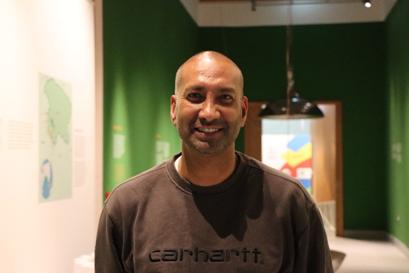‘Prayers for the Past’, a new exhibition by Birmingham-based artist Tasawar Bashir, opens today at the National Memorial Arboretum in Staffordshire exploring previously untold stories of historic service and sacrifice from Birmingham’s South Asian communities, as part of the Arboretum’s ‘Sports, Service and the Commonwealth’ summer programme.
Commissioned by the Arboretum and Sampad, an arts charity that connects people with South Asian arts and heritage, ‘Prayers for the Past’ combines soundscapes with sculptural objects to explore how a community has come together to bridge the gap between the known and unknown, honouring their ancestors who served and sacrificed in both World Wars.
During the First and Second World Wars, Indian Army recruitment was heavily concentrated on rural areas known presently as Pakistan Punjab, Indian Punjab, the North West Frontier, Azad Kashmir, and Bangladesh, where many were known begaris, the landless. They were the forgotten unsung heroes, playing vital roles as low rank soldiers or non-military functionaries such as porters or stretcher bearers. Due to their low profile and less glamorous roles, their history was largely ignored by official military narratives and subsequent generations of British-born South Asians have either no knowledge or many unanswered questions about elders who took part in various military campaigns.
Wanting to explore the stories of those who served, Tasawar Bashir studied letters written by soldiers held in the British Library, referred to the work of scholars such as Yasmin Khan, Santanu Das and Ghee Bowan, and consulted with community elders who Bashir worked alongside for 12 months in Birmingham. The exhibition features soundscapes, sculptural bowls and a digital prayer mat with elders remembering the lives of veterans who lived in Birmingham whilst reflecting on the minds of young men who felt they were seeing the end of their world edge closer each day.
“When these brave servicemen returned from their military campaigns, they returned with stories about the world they had seen, with money in their pockets and with military pensions, some were awarded tracts of land,” Bashir explains. “The story of how South Asian communities came to settle in Britain from the 1930s onwards can, in part, be explained by the forgotten story of these men and women. Those living in the Diaspora today, areas such as the West Midlands, have been left impoverished by having no officially-recorded history of this period.”
“As an artist my work explores creative methods and modes of expression to tackle social injustice,” continues Tasawar. “I believe some communities struggle because they do not fully grasp their cultural capital – especially when their social histories are hidden or distorted. When a community’s history contains gaps, due to trauma or other factors, it leaves a collective void that each member carries – most often unknowingly. It has been inspiring to work with community elders to unearth some of the previously untold stories, filling the knowledge gap, while recognising their incredible service.”
“This summer at the Arboretum we are shining a light on the relationships between people of the Commonwealth who have served alongside each other, and ‘Prayers for the Past’ gives our visitors a unique opportunity to explore the previously overlooked contribution of Birmingham’s South East Asian communities,” said Mark Ellis, Interim Lead at the National Memorial Arboretum. “Tasawar’s concept of using the voices of elders to share the stories of their forefathers is incredibly thoughtful, powerful and challenging, and an innovative way to pass the baton of remembrance to the next generation.”
“As an organisation, we strive to amplify unheard voices from South Asian communities in Britain and believe in the power of arts and heritage to bring people together from all walks of life, explains Piali Ray, Artistic Director & CEO from Sampad. “The Arboretum shares our passion for telling stories and we worked closely together to find the right artist to honour the contributions of the unsung heroes of the World Wars within the British South Asian community. Tasawar’s evocative sound art installation will bring this forgotten part of our shared history to life to new audiences, helping to break down barriers and enrich mainstream culture in the UK.”
The free ‘Prayers for the Past’ exhibition by Tasawar Bashir is supported by The MECC Trust, an independent charity established in 1979 to help residents in one of Birmingham’s poorest wards, and is part of the ‘Sports, Service and the Commonwealth’ programme running throughout summer 2022 at the National Memorial Arboretum in Staffordshire. Timed to coincide with the Birmingham 2022 Commonwealth Games, the programme of exhibitions, events and activities shine a light on the camaraderie of communities from across the Commonwealth who have served alongside each other, while highlighting the important role of sport in the Armed Forces. This new programme of activities is presented as part of the Birmingham 2022 Festival. For the full programme, visit: www.thenma.org.uk/commonwealth














